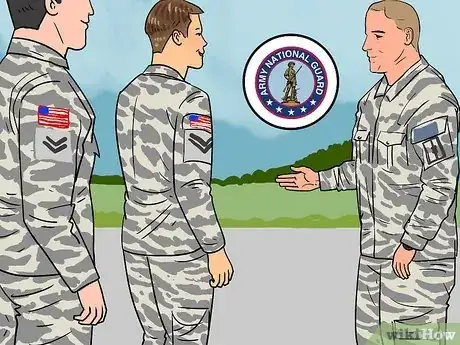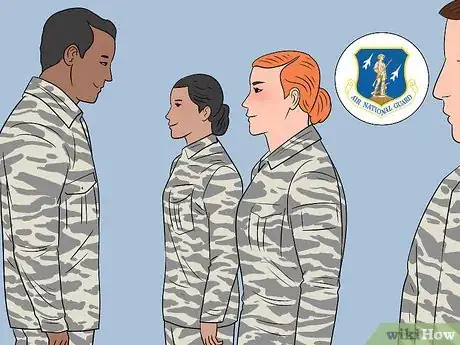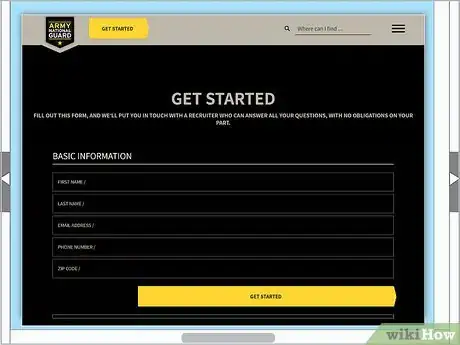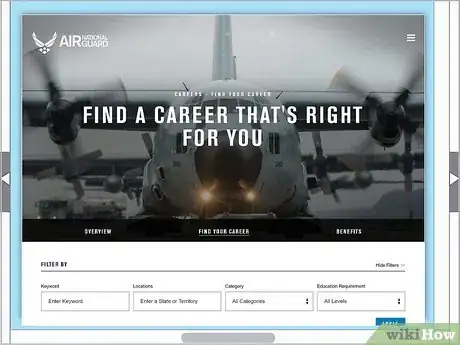This article was co-authored by Ted Coopersmith, MBA and by wikiHow staff writer, Janice Tieperman. Ted Coopersmith is an Academic Tutor for Manhattan Elite Prep, a test prep and academic tutoring company based in New York City. In addition to general academic advising, Ted has expertise in preparing for the ACT, SAT, SSAT, and ASVAB tests. He also has over 30 years of financial controller advising and consulting experience. He holds a BA from the City University of New York (CUNY) and an MBA from Pace University.
There are 17 references cited in this article, which can be found at the bottom of the page.
This article has been viewed 13,524 times.
The Army National Guard and Air National Guard are branches of the Army and Air Force that allow you to join the military part-time. Unlike other branches of the military, the National Guard has a specific focus on helping smaller communities in times of trouble (i.e. a natural disaster). Although members of the National Guard are considered civilians, they called be summoned by the state governor in times of need. As long as you meet the requirements, you can begin a life-changing journey with the National Guard.
Steps
Meeting the Eligibility Requirements
-
1Join the Army branch to provide help during a crisis. The Army National Guard serves as a branch of the Army and it is focused on providing land-based assistance. Each state is required to have its own National Guard by the order of the Constitution.[1] If you want to be a part of the military while still maintaining a civilian life, the Army National Guard may be a good option for you.[2]
- While the Army National Guard mostly operates on a state level, the group is still required to follow military rulings and national law.[3]
- Although there are 2 separate branches of the National Guard, their differences are more historical than modern. Above all else, both branches prioritize in aiding American communities instead of working in different countries.[4]
-
2Sign up for the Air branch to offer air-based help. Like the Army National Guard, the Air National Guard is a part-time branch of the Air Force. While members of the Air National Guard primarily exist to help during domestic disasters, their focus is on providing airborne aid.[5]
- Unlike the Army National Guard, the Air National Guard is not mandated to exist by the Constitution.[6]
Advertisement -
3Be ready to commit for 6-8 years. Even if you meet the physical requirements for joining the National Guard, you should make certain that your schedule allows you to be eligible for enlistment. Although the National Guard is a part-time military service, all members must be ready to travel and help communities in need at a moment’s notice.[7]
-
4Meet the age and education requirements. Make sure that your age falls into the eligibility range of the National Guard. Although the Army and Air National Guard both have a core mission of helping the community, there are a few differences to keep in mind. The age range for joining the Army National Guard is 17-35, while the range for the Air National Guard is 17-39.[11]
-
5Provide proof of citizenship and health. In order to be eligible for the National Guard, you will have to verify your identity and status as an American citizen. In addition, you will need to have medical paperwork on hand to prove that you are healthy enough to enlist.[14]
- A passport will prove both your identity and citizenship to the military. If you don’t have a passport, a combination of a Driver’s License/ID card and a birth certificate or social security card can also be used.[15]
- Check with your recruiter if you are unsure about which medical documents you need to have on file.[16]
-
6Take the ASVAB test. Before you can enroll in the National Guard, both branches require that you pass the Armed Services Vocational Aptitude Battery (ASVAB) exam. The test will quiz you on your general knowledge of 8 different topics, including mathematics, general science, arithmetic reasoning, word knowledge, paragraph comprehension, auto and shop, mechanics, and electronics.[17]
- The test itself will take a total of 3.5 hours to complete. You can look at some sample questions to prepare for the test ahead of time.
- In order to join the National Guard, you need to score at least 50 on the test. The overall score is determined by combining 4 of the 8 subject test scores (mathematics, word knowledge, paragraph comprehension, and arithmetic reasoning).
- Talk to a recruiter if you have any questions about how to take the ASVAB test.[18]
- If you are still a student, talk to your school counselor about how to take the exam.[19]
Enlisting in the National Guard
-
1Locate your nearest recruiter to begin the enlistment process. The Army National Guard has an online submission webpage that allows you to send your contact information to the organization (https://nationalguard.com/get-started). After a recruiter reaches out, you should be able to schedule a meeting close to your location.[20]
- The Air National Guard also has an online webpage that allows you to digitally submit your contact information, which can you find here: https://www.goang.com/now.html. Their website also includes a list of nearby recruitment centers, so you can check and see which location is nearest to you.[21]
-
2Take time to research your salary and benefits online. Before you officially enlist, you should have a good grasp on the specifics of your potential position in the National Guard. The Air National Guard has a search engine to help you look up specific career options at: https://www.goang.com/careers/find-your-career.html. The Army National Guard also has an online resource that lets you look up your monthly income at: https://www.nationalguard.com/benefits. Both branches will provide you with financial aid for any future college education.[22]
- Career options in the Air National Guard range from flying a helicopter to performing administrative duties. You may need an undergraduate or medical degree for certain positions.[23]
- The Army National Guard also has a variety of careers to choose from, ranging computer-centric positions (i.e. cyber careers) to jobs that involve handling heavy-duty weapons.[24]
- Joining the National Guard also entitles you to health care, life insurance, and tax benefits.[25]
-
3Attend Army boot camp for 10 weeks if you joined the Army National Guard. After your acceptance into the Army National Guard, you will have to participate in a 10-week boot camp.[26] Once the boot camp is over, you will also have to attend training for 1 weekend of every month.[27]
- After an introductory week (known as Zero Week), the first 3 weeks are known as the Red Phase. These focus on teamwork activities. The next 3 weeks are known as the White Phase, which focus on more physically intense training. The last 3 weeks are known as the Blue Phase, and you'll spend time on practice exercises and meeting graduation requirements.[28]
- In order to graduate, you need to pass a fitness test and be able to demonstrate your skills with certain weapons and exercises.[29]
-
4Attend Air Force boot camp for 8.5 weeks if you joined the Air Force National Guard. Once you have been accepted into the Air National Guard, you will have to attend an 8.5-week-long boot camp. Unlike Army boot camp, each week of Air Force boot camp focuses on a different set of lessons.[30]
- Most days at Air Force boot camp are spent doing a combination of physical training and classroom study.[31]
- Check online and familiarize yourself with the Air Force military unit.[32] Knowing what to expect on a general basis may help you to feel more prepared when entering into training camp.
- Depending on your career selection in the Air National Guard, your total training time may be longer.[33]
-
5Be ready at all times during your enlistment. While the National Guard only has a part-time commitment, you should be active and attentive to your schedule. Both branches will require you to work 1 weekend of every month, with the possibility of additional training dates as well.[34]
Expert Q&A
-
QuestionWhat are the academic subject areas of the ASVAB?
 Ted Coopersmith, MBATed Coopersmith is an Academic Tutor for Manhattan Elite Prep, a test prep and academic tutoring company based in New York City. In addition to general academic advising, Ted has expertise in preparing for the ACT, SAT, SSAT, and ASVAB tests. He also has over 30 years of financial controller advising and consulting experience. He holds a BA from the City University of New York (CUNY) and an MBA from Pace University.
Ted Coopersmith, MBATed Coopersmith is an Academic Tutor for Manhattan Elite Prep, a test prep and academic tutoring company based in New York City. In addition to general academic advising, Ted has expertise in preparing for the ACT, SAT, SSAT, and ASVAB tests. He also has over 30 years of financial controller advising and consulting experience. He holds a BA from the City University of New York (CUNY) and an MBA from Pace University.
Academic Tutor The 4 academic areas are Arithmetic Reasoning, Paragraph Comprehension, Word Knowledge, and Mathematical Knowledge.
The 4 academic areas are Arithmetic Reasoning, Paragraph Comprehension, Word Knowledge, and Mathematical Knowledge. -
QuestionCan a person be in both the National Guard and army?
 SpaceshipCommunity AnswerNo that is not possible, you can either be in the army or the National Guard.
SpaceshipCommunity AnswerNo that is not possible, you can either be in the army or the National Guard.
References
- ↑ https://www.military.com/join-armed-forces/us-military-overview.html
- ↑ https://militarybenefits.info/national-guard/
- ↑ https://www.111attackwing.ang.af.mil/Questions/
- ↑ https://militarybenefits.info/national-guard/
- ↑ https://www.111attackwing.ang.af.mil/Questions/
- ↑ https://www.military.com/join-armed-forces/us-military-overview.html
- ↑ https://militarybenefits.info/national-guard/
- ↑ https://militarybenefits.info/national-guard/
- ↑ https://nationalguard.com/guard-faqs
- ↑ https://www.goang.com/faq.html
- ↑ https://militarybenefits.info/national-guard/
- ↑ https://militarybenefits.info/national-guard/
- ↑ https://militarybenefits.info/national-guard/
- ↑ https://www.nationalguard.com/eligibility
- ↑ https://www.uscis.gov/i-9-central/acceptable-documents/list-documents/form-i-9-acceptable-documents
- ↑ https://www.nationalguard.com/eligibility
- ↑ https://www.nationalguard.com/the-asvab
- ↑ https://www.nationalguard.com/eligibility
- ↑ https://www.asvabprogram.com/student
- ↑ https://nationalguard.com/get-started
- ↑ https://www.goang.com/locations.html
- ↑ https://www.military.com/join-armed-forces/guard-and-reserve-faqs.html
- ↑ https://www.goang.com/careers/find-your-career.html
- ↑ https://www.nationalguard.com/careers
- ↑ https://www.military.com/join-armed-forces/guard-and-reserve-faqs.html
- ↑ https://www.military.com/join-armed-forces/army-national-guard-boot-camp-schedule.html
- ↑ https://www.nationalguard.com/how-to-join
- ↑ https://www.military.com/join-armed-forces/army-national-guard-boot-camp-schedule.html
- ↑ https://www.military.com/join-armed-forces/army-national-guard-boot-camp-schedule.html
- ↑ https://www.military.com/join-armed-forces/air-force-bmt-boot-camp-schedule.html
- ↑ https://www.military.com/join-armed-forces/air-force-bmt-boot-camp-schedule.html
- ↑ https://www.111attackwing.ang.af.mil/Questions/
- ↑ https://www.goang.com/faq.html
- ↑ https://militarybenefits.info/national-guard/
















-Step-10-Version-3.webp)




















































